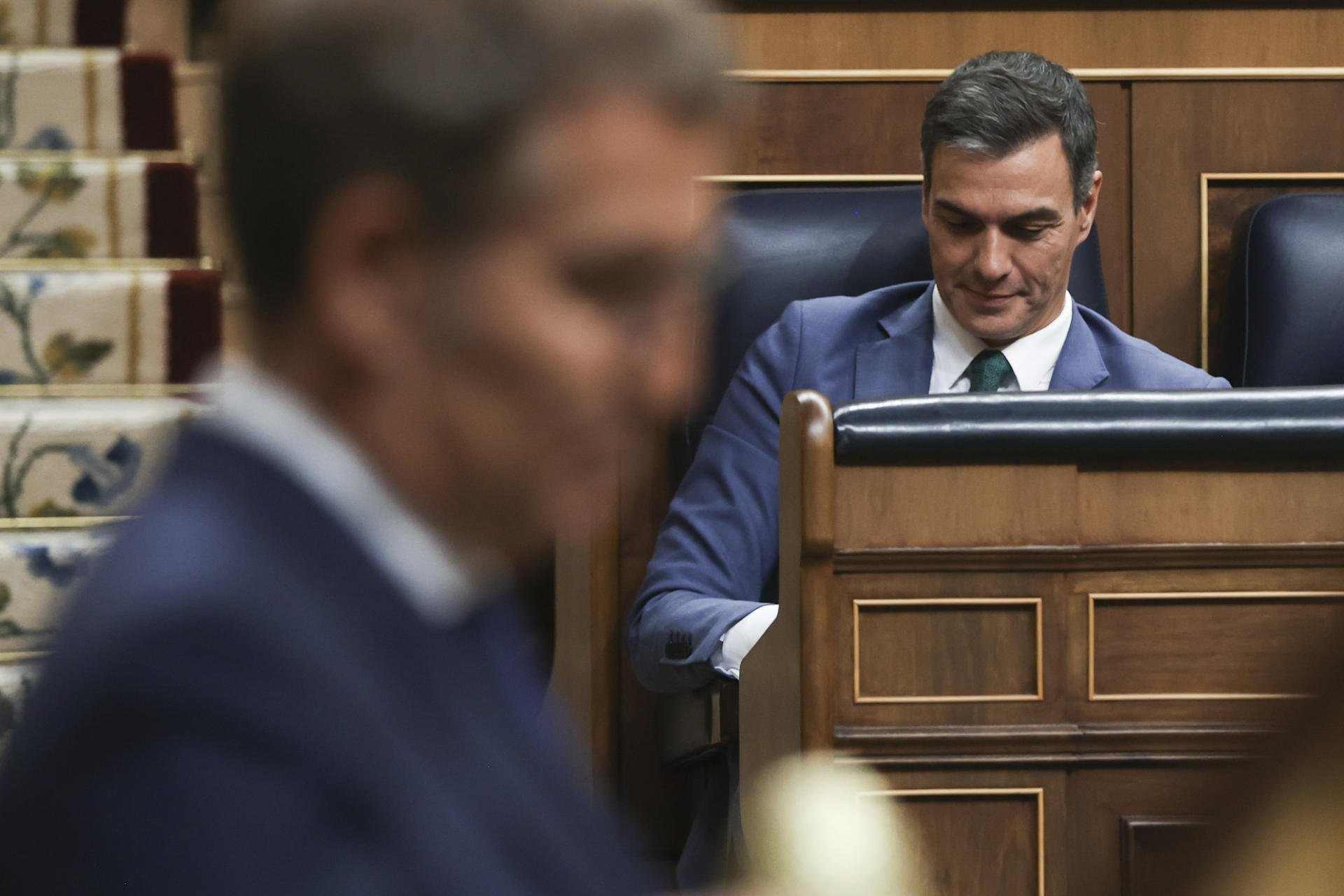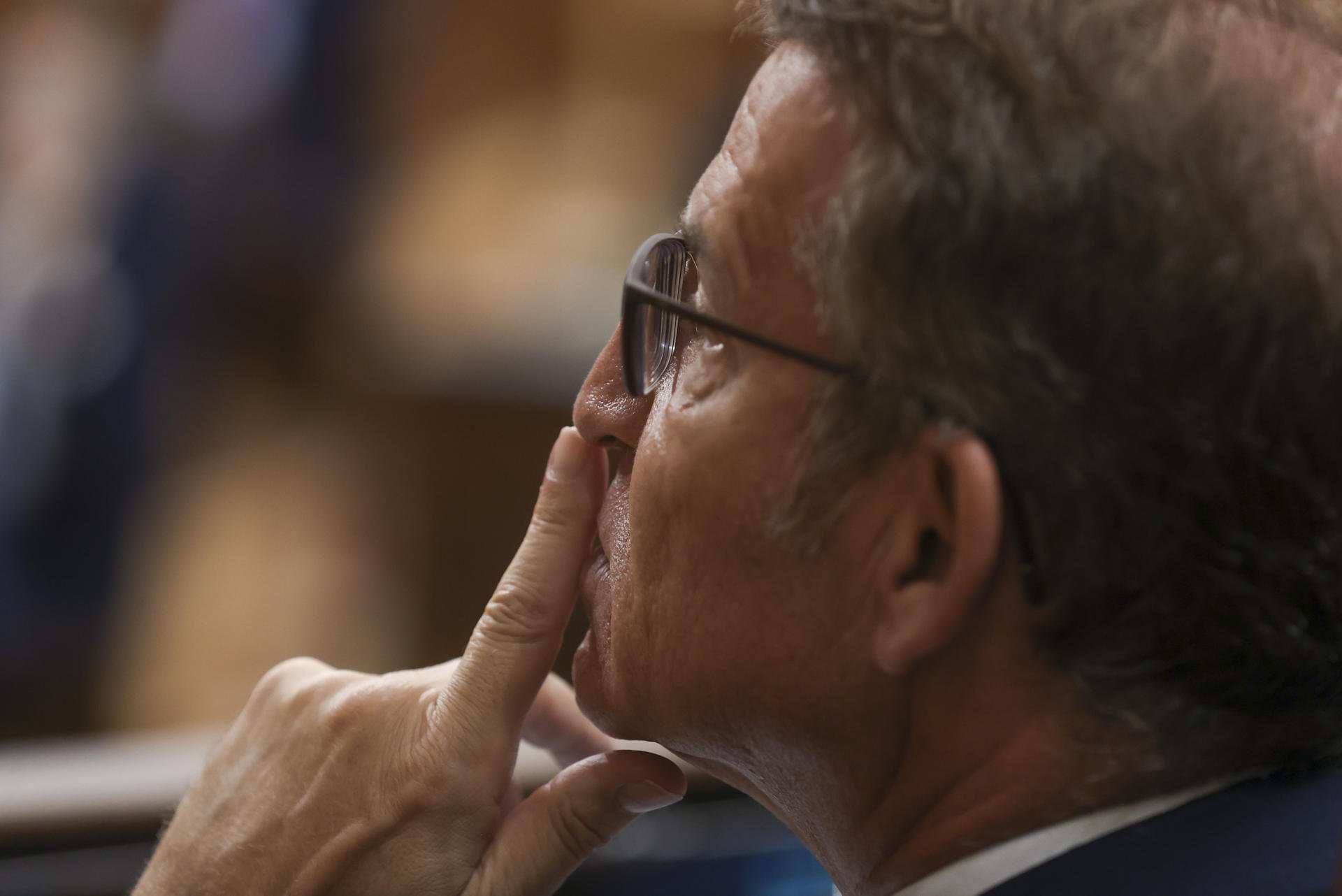Alberto Núñez Feijóo arrived this Tuesday at the Spanish Congress of Deputies with clear intentions: to turn his investiture debate into a face-to-face confrontation with Pedro Sánchez over the proposed amnesty law. The acting Spanish prime minister ruined his plans. Faced with the dilemma as to who would reply to the PP's leader on behalf of the PSOE —Sánchez himself or the parliamentary group's spokesperson, Patxi López— the Socialist leader opted for a surprise move: one which turned the debate in another direction, allowed him to avoid having to say anything about the amnesty and which combatted the PP's mantra that the party most voted at the July 23rd election should rule. It was not possible, however, to avoid Carles Puigdemont being the protagonist of the investiture debate, with practically all speeches having a hypothetical pact for a law that would put an end to the persecution of Catalan independence activists as their main point.
It was the first part of the debate on voting in Alberto Núñez Feijóo as Spanish prime minister; a session that began at noon, and ended after 9pm, and will resume this Wednesday from 9am. It will be then when the PP's leader loses —if there are no surprises— the first vote to enter the Moncloa palace. On Friday, 48 hours later, the second vote will be held, in which he needs a simple majority.
The image of the day on Tuesday was summarized by the invitation by the speaker of parliament, Francina Armengol, to PSOE MP Óscar Puente to go up to the rostrum and give the response to Feijóo's speech on behalf of his parliamentary group; with the laughter of the Socialist bench and the angry shouts of the PP MPs, who called the acting Spanish prime minister a "coward". Sánchez's chose this MP because of an obvious parallel with today's situation: Puente ceased to be mayor of Valladolid last June due to the fact that, despite the Socialist politician having won the local election, the PP and Vox signed a government pact to take power in the city.
The Spanish prime minister thus killed two birds with one stone. He managed to refute Feijóo's demand to let the most voted party on 23-J rule and, in addition, he managed to divert the debate and thus avoid a face-to-face in which Feijóo would have attacked the amnesty and Carles Puigdemont's figure relentlessly.

Feijóo attacks with the amnesty
It was evident from the first moment that Feijóo's most powerful weapons to win the debate with Sánchez were the amnesty and the acting Spanish government's calls to the capital of Catalan exile, Waterloo. The PP leader did not take much more than a minute to mention this possible law. He started with a heavy criticism of Pedro Sánchez, as if it were a speech for a no-confidence motion, and pointed out that the acting Spanish prime minister is captive of Junts per Catalunya and Esquerra Republicana. "I will not do such a thing because I have principles, limits, and I'm a man of my word," he said about an amnesty, and appealed to the "integrity" of the Socialist leader.
Feijóo buries the promise of sedition with a new crime: institutional disloyalty
Besides the amnesty, Feijóo appeared in parliament requesting to be elected as Spanish prime minister and, in the initial intervention, launched a battery of proposals to convince some more MPs besides the 172 he already has in his pocket. The main contribution of the speech was to renounce one of his proposals of the 23J electoral campaign, reinstating the crime of sedition. Against all expectations, he proposed the creation of the crime of constitutional disloyalty, of which no further details were given, beyond stating that it has "the spirit of sedition", as PP sources explained. In addition, he promised to toughen the crime of embezzlement that the PSOE and ERC modified in the framework of the Criminal Code reform.
Carles Puigdemont capitalizes on Feijóo's investiture debate
The figure of the Catalan president in exile, Carles Puigdemont, hung over the investiture debate at all times thanks to Feijóo, who wanted to end the PSOE negotiations, but used the Junts leader as the basis of his attack. Even in the response to Vox's leader, Santiago Abascal, the Galician politician pointed out the relationship between Madrid and Waterloo: "If Puigdemont says no, you will not be prime minister," said Feijóo addressing his Socialist rival. "The political project should be to defeat the investiture candidate who won the elections, not to present your candidature based on Puigdemont's votes" stated Feijóo, who considers the amnesty pact to be a done deal.
Demano la paraula per al·lusions ✋, @F_Armengol @Congreso_Es @JuntsXCat.
— krls.eth / Carles Puigdemont (@KRLS) September 26, 2023
Tweet from Carles Puigdemont, jokingly asking the speaker of Congress for the right of reply because of "allusions" to him.
Feijóo also opposed Sánchez and recalled that, had he wanted to, he could also have accepted Junt's conditions to be elected as prime minister. He stated that he was "within reach" of the votes to become prime minister, but that he did not accept "the price they asked of me". He argued that Puigdemont offered him "exactly the same" as the Catalan leader had demanded from Pedro Sánchez. After being mentioned by Feijóo, Carles Puigdemont claimed his protagonism from a distance. In a tweet on X, the Catalan president in exile asked Francina Armengol, the Spanish parliamentary speaker, for a turn to speak in view of the avalanche of references to him that were coming from Madrid. But Feijóo's argument is fallacious: signing a pact with Junts would make him lose the support of Vox.
Nogueras: "Independence is a matter of survival for our nation".
When it was Junts per Catalunya's turn, Míriam Nogueras highlighted the dependence of Spanish politics on her party, and criticized that Feijóo's discourse was "clear": "One and not fifty-one, and Puigdemont to prison" [The first one is a fascist motto, the second is a famous chant in anti-Catalan demos]. She also recalled that "independence is a matter of survival for our nation", in addition to stating that "there can be intelligent life outside Spain". Thus, Nogueras criticized Núñez Feijóo for presiding over an "anti-Catalan" party, and recalled, for example, the anti-Catalan crusade that the PP made against the Catalan statute. The leader of Junts in the Spanish parliament ended her speech assuring that "the Catalan people have the right to democratically execute the decision they made in the October 1st referendum", and assured there are no "legal impediments" to hold the referendum. "What is lacking is political will," she added.
ERC places Feijóo in the "past" and demands a referendum in addition to amnesty
On his turn, Gabriel Rufián, ERC's leader in Madrid, lambasted Feijóo for organizing "a kind of motion of no-confidence" which evidences that the PP leader "is neither present nor future, but past". "He is adopting the face of Pablo Casado and Albert Rivera, the face of someone who still does not understand what is happening," he criticized. Once Rufián ruled out supporting Feijóo, he decided to focus his speech on "the historic opportunity" the PSOE has: "If Spanish democracy has endured the amnesty of corrupt people and real coup perpetrators, however weak it may be, it will also endure the amnesty of democrats and real activists". And he sent a joint message to Pedro Sánchez and Yolanda Díaz: "Amnesty is not the end, it is the return to politics". "Either this contemplates a way out for the people of Catalonia to vote their political status, or it will be of very little use; an amnesty for the events of October 1st must lay the foundations for a new October 1st" he said.

